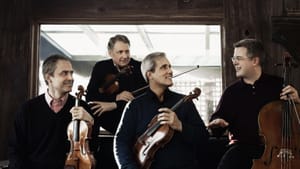Stay in the Loop
BSR publishes on a weekly schedule, with an email newsletter every Wednesday and Thursday morning. There’s no paywall, and subscribing is always free.
The art of grief
PCMS presents the Emerson Quartet

Emerson String Quartet has enjoyed a long and fruitful association with Philadelphia Chamber Music Society (PCMS). The group used their most recent appearance to offer the local premiere of Shroud, a commissioned work for strings by British composer Mark-Anthony Turnage.
Turnage — whose operas include an adaptation of Seán O’Casey’s Expressionist masterpiece The Silver Tassie as well as Anna Nicole, based on the life of late Playboy Playmate Anna Nicole Smith — doesn’t shy away from humor or cheekiness in his work. Although Shroud functions as a requiem of sorts for two of Turnage’s deceased friends, his playfulness remains evident throughout.
Stringing the blues
The work’s five-movement structure offers three lighter sections bookended by a throbbing Threnody and forceful Lament, suggesting that life offers moments of levity even during our darkest periods.
First violinist Eugene Drucker dominated the Threnody. His wailing, achromatic lines emerged as cries of anguish, buffeted by Lawrence Dutton’s textured accompaniment on the viola. Program notes informed the audience that Turnage composed this movement in honor of Christopher Mills, who “introduced me to a lot of non-classical music, like Howlin’ Wolf and black soul.” I failed to detect any popular-music influences throughout the piece, but the depth of the composer’s love and loss for his friend were plainly apparent.
Cellist Paul Watkins, who joined the quartet in 2013, distinguished himself in the Lament. This section offers a rich, almost Baroque cello line; Watkins spun out mournful phrases that resembled words catching in a bereaved person’s throat. Although more lyrical than the Threnody, the eight-minute Lament retained a tense, jagged edge that communicated the futility of wishing for catharsis.
This aligned thematically with the three central movements — two Intermezzos and a spirited March — which retained an air of melancholy despite expressions of joyous ebullience. The 30-minute composition ended almost abruptly, the music fading into the ether as the quartet sat almost paralyzed. It felt appropriate. We never know when grief will overtake us or when it will disappear, certain to return some other time.
Hard act to follow
Regrettably, the remaining program never matched the artistic level of Shroud. The evening opened with a banal reading of Haydn’s String Quartet in C Major, Op. 20, No. 2. I found nothing wrong with the quartet’s reading of this repertory staple, and therein lies the problem. The performance they offered was largely indistinguishable from many others I have heard. Unlike his notable contributions to Shroud, Watkins played this piece’s opening cello solo soporifically, setting the tone for a sleepy interpretation. I expect more from one of the world’s great chamber ensembles.
Tuning problems plagued the opening movement of Robert Schumann’s String Quartet in A Major, Op. 41, No. 3. Although the quartet corrected itself as the piece progressed, the overall performance remained several notches below brilliant. More satisfying was their encore selection: a string arrangement of Bach’s finale chorale, which they sublimely dispatched. But I hardly sensed they were stretching themselves with this choice.
Still, the presence of Shroud was enough to render the recital memorable. It served as a reminder that one need not always look backward for great classical music. Our contemporary composers have much to say.
What, When, Where
Emerson String Quartet. Eugene Drucker, violin; Philip Setzer, violin; Lawrence Dutton, viola; Paul Watkins, cello. Franz Joseph Haydn, String Quartet in C Major, Op. 20, No. 2, Hob. III:32; Mark-Anthony Turnage, Shroud for string quartet; Robert Schumann, String Quartet in A Major, Op. 41, No. 3. Philadelphia Chamber Music Society. December 6, 2017, at the Kimmel Center’s Perelman Theater, 300 S. Broad Street, Philadelphia. (215) 569-8080 or pcmsconcerts.org.
Sign up for our newsletter
All of the week's new articles, all in one place. Sign up for the free weekly BSR newsletters, and don't miss a conversation.

 Cameron Kelsall
Cameron Kelsall